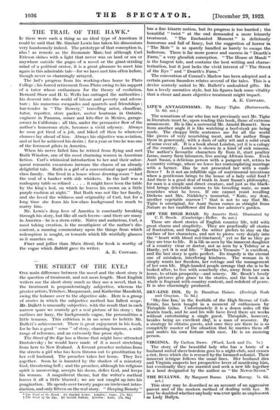THE TRAIL OF THE HAWK.*
IF there were such a thing as an ideal type of American it could be said that Mr. Sinclair Lewis has taken his dimensions very handsomely indeed. The prototype of that conception is, alas ! as remote as the Economic Man; but although Carl Ericson shines with a light that never was on land or sea or anywhere outside the pages of a novel or the giant-striding mind of a political orator, it is a great pleasure to meet him again in this admirable tale—for we have met him often before, though never so charmingly arrayed.
The lad's progress from his working-class home to Plato College ; his forced retirement from Plato owing to his support of a tutor whose enthusiasm for the theory of evolution, Bernard Shaw and H. G. Wells has outraged the authorities ; his descent into the world of labour and poverty and adven- ture ; his numerous escapades and quarrels and friendships ; bar-tender in " The Bowery," travelling actor, chauffeur, tutor, reporter, store packer, motor boatman in Ontirio, engineer in Panama, miner and kite-flier in Mexico, garage- owner in California : all this, under the persuasive flow of the author's humorous style, becomes a vivid odyssey. Always he soon got tired of a job, and hiked off then to whatever chances, lay ahead of him. Always his objective was aviation, and at last he achieved his desire ; for a year or two he was one of the foremost pilots in America.
When his nerve failed him he retired from flying and met Ruth Winslow, one of the most charming women in American fiction. Carl's whimsical introduction to her and their subse- quent romantic excursions increase the charm of an already delightful tale. Ruth is a girl of a conventional upper middle class family. She lived in a house whose drawing-room " had the soul of a banker with side whiskers. In the hall was a mahogany table so refined . . . . it might have been the table by the king's bed, on which he leaves his crown on a little purple cushion at night." But Ruth was not like her family, and she loved the wildness and originality of Carl, but for a long time she fears his low-class background too much to marry him.
Mr. Lewis's deep love of America is constantly breaking through his story, but like all such lovers—and there are many in America—he is a stern critic. Naive and audacious, Carl, a most taking creation, is the mouthpiece of the author's dis- content, a running commentary upon the things from which redemption is sought, or towards which life wistfully glances as it marches on.
Finer and jollier than Main Street, the book is worthy of the vogue which Babbitt gave its writer. A. E. COPPARD.


































 Previous page
Previous page